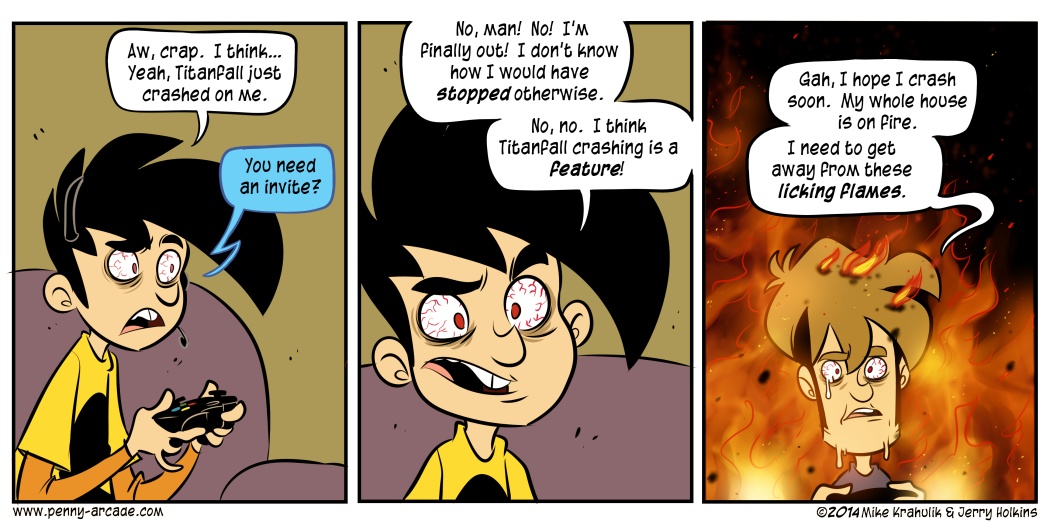I wouldn't say I'm bullish on gaming from the cloud yet, but I've had the kind of experiences with it where I have seen the thesis made manifest. For me, it's largely genre dependent - but If I squint I can absolutely see the proposition as a real thing that meaningfully happens for a lot of people in the real world.
I bring my Steam Deck with me on trips often, but it almost never gets used. A trip is essentially the perfect time to have a computer in this form factor, and the kind of scenario a hardware designer fantasizes about when they decide to encase their dreams in silicon flesh. I know lots of people who have, through various wizardries, transformed their Decks into gore-caked altars of emulation - or worse. I understand it as a practical matter, but I almost never return to old games. I don't even know why I'm hedging: I don't. Whenever I'm on a plane or a trip, for some reason, any downtime gets plowed into books.
But not even, like, new books. That's not what I want in these cases, and for some reason the rule is the inverse of the game one. What I want is a book I've read before. I know. I know! I also watch the same movies on trips - I've literally watched The Town at least once every time I go to Boston for PAX East. That means that, on some trips, I watch it more than once.
More than twice.
It really seems like this would be the optimal scenario for experiencing new things, but perhaps because everything else around me is new these pieces of content act as stable anchors. That's the best I can think of. Here are three books I read often on trips, which must be some index of their nutrient-packed crannies.
There Is No Antimemetics Division: Originally a series posted directly to the SCP Foundation, an organization whose remit is so vast as to defy this post's ability to "contain" it, this is a top five book for me and I read a lotta fucking books. Did you ever want Kris Straub to write a novel, except he was too busy revolutionizing every genre he touches whenever he wasn't inventing them from whole cloth? Well, if you're looking for a completely fascinating take on horror stemming from the nature of human perception itself, the intriguingly named "qntm" has you dialed in. I've read it seven times and I'm scared each time even though I know everything that is going to happen, and I keep finding chapters I don't remember fully from previous readthroughs, or interesting nibbles of context, which is frankly of a piece with the thesis.
LEGION: Now… this is a Warhammer 40k book. But it is by Dan Abnett, who sort of exists in his own place in the continuum of the fiction. Just to make things even more perverted, this would technically be considered a 30K novel because it concerns the events that set up the modern setting - Loyalist Chapters and Traitors, arrayed against one another. This is where those battle lines start getting drawn. It's primary concern is the Alpha Legion, a heretical sect, masters of subterfuge, and where their loyalties truly lie even in the modern era. I used to think the book asked interesting questions but was ultimately ambiguous on this point, but I've read it enough times now that I think it's quite clear. Didactic, even. Five times.
Nineteen Eighty-Four: I've read this book more times than I can count. People sort of know what this book is, either because they've read about it, they've heard about it, or - and this is the most common one - they're up to their fucking asses in the world Orwell predicted. Its prescience is so profound, and the linguistic tools it offers to describe the open-air prison we serve in of such high utility, that its fangs are almost sanded down by ubiquity and repetition. Doublethink. Newspeak. Memory hole. Big Brother. Thought police. People nearly recoil from the world Orwellian precisely because it is overused - and it's only overused because it's accurate, which is a sad sort of slow-motion doom. He saw the whole thing seventy-five years ago. The other thing about it that I think is especially profound is that it's the opposite, in some ways, of a Rorchach Test. Everyone thinks that this book is about their political opponents, when it is about themselves. That is the lesson of Room 101. It's literally in the book. That's what the entire book is about.
(CW)TB out.
